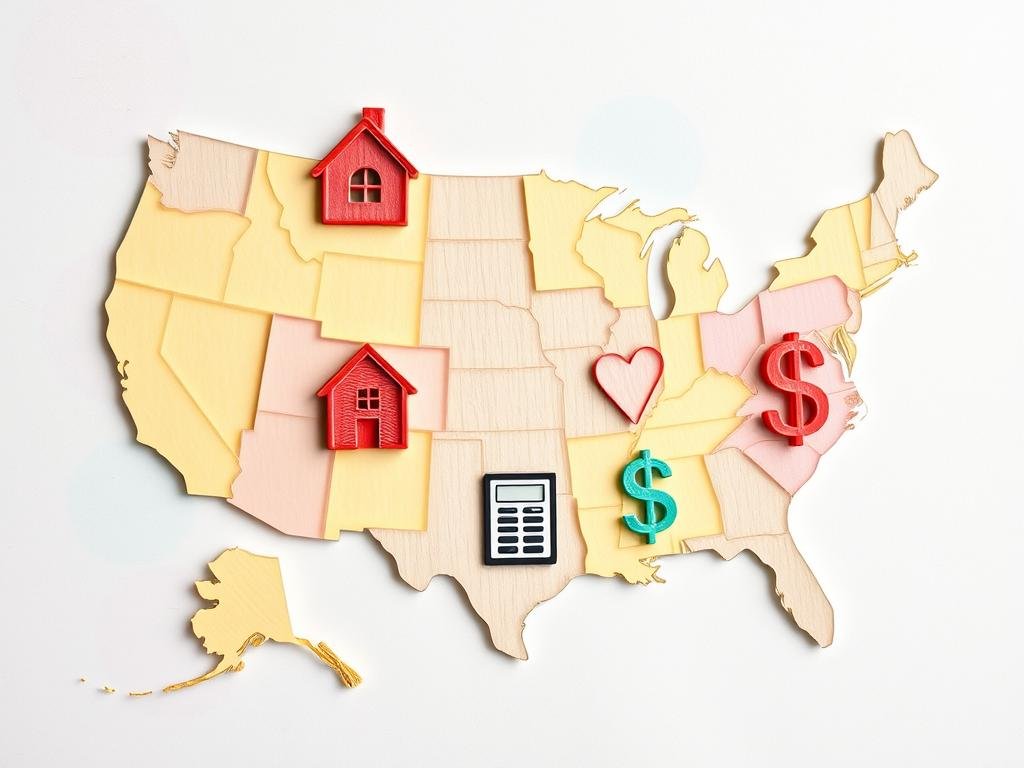About 20% of seniors in the U.S. could save on taxes with housing deductions, yet few do. This gap offers a big chance for them and their families to keep more money during retirement. We will show you how to use these tax perks for senior housing costs through deductions and credits.
Key Takeaways
- Understand the different types of senior housing expenses that qualify for tax deductions.
- Learn why tax benefits are crucial for seniors to manage their housing costs.
- Explore various senior housing options available today.
- Gain insights into qualifying expenses for tax deductions such as accommodation, medical expenses, and amenities.
- Find out who can claim tax benefits on senior housing expenses: seniors, their dependents, caregivers, and family members.
- Differentiate between tax deductions and tax credits to determine which is more beneficial for your circumstances.
- Discover the intricacies of state-specific tax laws and their impact on senior housing expenses.
- Tips on maximizing tax benefits by keeping accurate records, planning ahead, and consulting a tax professional.
- Avoid common mistakes such as misunderstanding qualifying expenses and missing deadlines.
- Access resources for senior housing financial planning through government websites and non-profit organizations.
Understanding Senior Housing Expenses and Their Impact
Senior housing costs are varied and greatly impact elderly individuals’ living quality and financial plans. It’s crucial to know these expenses to use benefits fully and enjoy a secure retirement.
What Constitutes Senior Housing Expenses?
Senior housing expenses break down into key components:
- Accommodation Costs: This includes payments for places like retirement communities and assisted living facilities.
- Medical-Related Expenses: Costs for health care at these facilities, whether it’s for regular or urgent care.
- Service Fees: Extra charges for meals, cleaning, transport, and fun activities.
Handling these costs well can result in major tax savings. This makes senior living more budget-friendly and pleasant.
Why Tax Benefits Matter for Seniors
Tax benefits, such as deductions for elderly housing, are vital in lessening seniors’ financial strain. Using these tax breaks helps seniors save money. This supports their independence and life quality. The trick is to keep updated on deductions and credits related to senior housing costs. This ensures they make the most of these financial benefits.
Types of Senior Housing Options Available
Planning for retirement means looking at different senior housing options. There are independent living communities, assisted living facilities, and nursing homes. Each one offers special services for older adults’ needs. It’s also a chance to save money through retirement community tax savings and senior living tax breaks.
Independent Living Communities
Independent living is for seniors who need less help. They enjoy community perks like meal plans and cleaning services. Social events and fitness centers are available too. Selecting this option may qualify you for senior living tax breaks, depending on the amenities.
Assisted Living Facilities
Assisted living offers personal care alongside housing. It’s for seniors who need help with everyday tasks. Look into elder care tax credits for these services. They can lower costs, especially for medical expenses.
Nursing Homes
Nursing homes offer full-time care for seniors needing medical support. Highly trained staff provides this constant care. If most services are medical, you might save money with tax credits and deductions.
Looking at all the senior housing options can find the right fit for your loved one. Each option has benefits that can save money while offering care and comfort.
Qualifying Expenses for Tax Deductions
Understanding which expenses qualify can help you save on taxes if you’re a senior. You can deduct costs like accommodation and medical expenses. Let’s dive into how you can use these tax advantages.

Accommodation Costs
Rent, mortgage interest, and property taxes are part of accommodation costs. If you stay in an assisted living place, you can also include room and board fees. Keeping accurate records of these costs can lower your taxes.
Medical Expenses Related to Housing
Seniors often have big medical expenses that are tax-deductible. This category includes costs for medical care, medications, and specific therapies. The IRS offers a medical expense deduction for seniors if these costs exceed 7.5% of their adjusted gross income. This can offer significant relief.
Services and Amenities
Senior housing often includes extra services like meals, transportation, and activities. If you need these services for health reasons, they might be tax-deductible. Keeping detailed records is crucial, as they help increase your deductible amount.
| Expense Type | Examples | Tax Deductible? |
|---|---|---|
| Accommodation Costs | Rent, Mortgage Interest, Property Taxes | Yes |
| Medical Expenses | Medical Care, Prescriptions, Therapies | Yes |
| Services and Amenities | Meal Plans, Transportation, Recreational Activities | Partially, if medically necessary |
Who Can Claim Tax Benefits on Senior Housing?
Finding out who gets tax benefits for senior housing is key to save money. Not only seniors but also their dependents and caregivers can get these benefits. The tax rules help lower the cost for those looking after seniors.
Seniors and Their Dependents
Seniors and their dependents can get tax breaks and credits. This helps with the cost of living in senior housing. You need to keep accurate tax records and make sure your dependent is eligible according to the IRS.
Caregivers and Family Members

Caregivers can get tax credits to help with the costs of senior care. This helps make care more affordable. To get these benefits, meeting certain rules is necessary. Talking to a tax expert can make filing easier and more accurate.
Tax Deductions vs. Tax Credits Explained
When you look into tax benefits for senior housing, it’s key to know about tax deductions and credits. Each can help save money in different ways. Let’s find out how they work and their benefits.

Key Differences Between Deductions and Credits
Tax deductions lower your taxable income. Say you get $10,000 in senior housing deductions. If your income is $50,000, this would bring it down to $40,000. This usually means you pay less tax.
Tax credits, like the elder care credit, cut down the tax you owe. If you get a $2,000 credit and owe $3,000 in taxes, you’d only owe $1,000. Credits are great because they knock off tax you owe, dollar for dollar.
Which is More Beneficial?
Choosing between deductions and credits depends on your financial situation. Generally, credits are better as they lower your tax bill directly. But, deductions are still useful. They can lower your taxable income and possibly your tax bracket.
Here’s a breakdown of key differences and benefits between the two:
| Aspect | Tax Deductions | Tax Credits |
|---|---|---|
| Impact on Taxable Income | Reduces taxable income | Does not affect taxable income directly |
| Impact on Tax Liability | Indirectly lowers tax liability by reducing taxable income | Directly lowers tax liability on a dollar-for-dollar basis |
| Application | More useful when you want to lower your overall taxable income | More beneficial for directly reducing the amount of tax owed |
| Example | Lowering taxable income from $50,000 to $40,000 with senior housing deductions | Reducing tax owed from $3,000 to $1,000 with elder care tax credits |
The Medical Expense Deduction and Seniors
Learning about the medical expense deduction for seniors can greatly help with tax savings. This deduction lets older people or their caregivers decrease various healthcare costs. This can lead to reduced taxable income and lower financial stress. Around 7% of seniors use itemized deductions on their taxes to claim medical expenses. It’s key to know what qualifies and the way to figure out these costs.
What Expenses are Included?
The range of deductible healthcare costs for seniors is wide. It covers expenses like payments for medicines, doctor visits, hospital stays, and medical devices such as hearing aids and wheelchairs. Moreover, seniors can also deduct costs for dental work, in-home care, and some long-term care services. These all add up under the medical expense deduction for seniors. This provides a significant way to handle large healthcare costs.
How to Calculate Your Medical Expenses
To correctly figure out and claim elderly medical claims, keep detailed records of all healthcare spending throughout the year. You can deduct costs that are over 7.5% of your adjusted gross income (AGI). This means only the part of your total medical costs above 7.5% of your AGI can be deducted. The average deduction for senior medical expenses was about $7,200 in 2020. Good record-keeping and understanding what expenses are allowed can greatly aid you.

Given that Medicare only covers about 64% of a senior’s healthcare costs and long-term care costs average about $100,000 a year, it’s vital to maximize deductions. This might include deducting expenses for certain procedures, treatment for chronic conditions, and even travel to medical visits. The aim is making the most out of healthcare tax deductions. This helps lessen the financial load of medical care during your retirement years.
| Category | Eligible Expenses |
|---|---|
| Prescription Medications | Insulin, prescribed drugs |
| Doctor & Hospital Services | Doctor visits, hospital stays, diagnostics |
| Medical Devices | Hearing aids, wheelchairs, prosthetic limbs |
| Dentistry | Examinations, treatments, surgeries |
| In-Home Care | Caretaker wages, nursing services |
| Long-Term Care | Fees for assisted living, nursing homes |
By fully using these deductions, you can better manage your healthcare costs. This ensures a healthier financial outlook as you deal with the challenges of medical expenses in retirement.
The Role of State Tax Laws in Senior Housing
Understanding tax laws for older adults is vital. Different states offer unique tax advantages for seniors. This can greatly help with your housing financial planning.
These differences in state tax benefits can lead to big savings on taxes. This means making smarter housing choices becomes easier.

Understanding State-Specific Benefits
Every state has its own elder tax policies. While some states have property tax breaks, others offer discounts on senior housing expenses. For example, California’s Property Tax Postponement Program lets eligible seniors delay their property taxes. In contrast, Florida reduces the taxable value of homes for seniors.
Knowing these elder tax rules can lead to big savings.
How to Navigate Different Regulations
The tax laws for seniors vary widely across the U.S. To keep up, visit your state’s tax website or talk to a tax expert. They can help you understand the local tax benefits for seniors. It’s also good to stay updated on any law changes.
Here’s a quick list of some states and their benefits for seniors:
| State | Benefit | Eligibility |
|---|---|---|
| California | Property Tax Postponement Program | 62+ years, income |
| Florida | Senior Citizen Property Tax Exemption | 65+ years, limited income |
| Texas | Over-65 Homestead Exemption | 65+ years |
| Pennsylvania | Property Tax/Rent Rebate Program | 65+ years, income |
| New York | Senior Citizens’ Exemption | 65+ years, income |
To conclude, knowing and using state-specific tax rules can make your housing decisions smarter and save you money.
Maximizing Your Tax Benefits
To get the most out of tax benefits, seniors need a good plan for records, future finances, and advice from pros. Let’s look at how you can use tax planning to your advantage.
Keeping Accurate Records
Good records are key for smart tax planning. Keep every receipt that has to do with your place to live. This includes costs for medical needs at home and other fees.
Meticulous record-keeping lets you prove your expenses and avoid trouble at tax time. In places like Boca Raton and Naples, where homes cost a lot, you might get big tax breaks.
Planning Ahead for Future Expenses
Thinking ahead about money matters is critical for saving on taxes. Keep an eye on how housing and health costs might rise. For example, property values in The Villages suggest costs could go up later.
By planning well, you can use your money wisely and get the most from tax deductions. Getting advice on elder finances helps tailor strategies to fit you.
Consulting a Tax Professional
Talking to a tax expert is super helpful for understanding complex tax rules and finding all your deductions and credits. They know about specific benefits in places like Palm Beach County and all about the U.S. tax laws.
Experts in elder finance can navigate the complicated world of tax planning for seniors. They make sure you take full advantage of benefits and keep up with tax rules.
Common Mistakes to Avoid
Filing taxes correctly is key, especially for seniors. It’s important for both seniors and their helpers to know the usual mistakes. This guide will help you avoid the big errors people make when filing taxes for seniors.
Misunderstanding Qualifying Expenses
Many people get confused about what expenses they can deduct. Not all living costs can lower your taxes. Mistakes in senior tax filings often happen because of this mix-up.
Medical costs related to senior living might be deductible, but general living costs usually aren’t. Always check which expenses are deductible to avoid mistakes.
Missing Deadlines
Another big error is not filing taxes on time. It’s very important for seniors to file on time because they need their deductions and credits. Not doing so can lead to penalties or losing important benefits.
Make sure to mark the deadlines on your calendar and submit your taxes early. Getting advice from a financial expert can also help keep your taxes in order.
| Common Mistakes | Potential Issues | Ways to Avoid |
|---|---|---|
| Misunderstanding Qualifying Expenses | Incorrect deductions, potential audits | Verify expenses with IRS guidelines, consult a tax advisor |
| Missing Deadlines | Penalties, loss of benefits | Keep a calendar, set reminders, seek professional advice |
Remembering these mistakes and knowing about tax benefits for the elderly can make tax time easier. Doing this will help you use all the tax benefits you can.
Resources for Senior Housing Financial Planning
When it comes to senior housing costs, using the right resources can really help. There are many government sites and financial tools for seniors. Also, there are non-profits and support groups ready to help. This section will show you important resources to help you through this tough process.
Government Websites and Financial Tools
The U.S. government has resources to help with elder care finances. Sites like Medicare.gov and Benefits.gov talk about benefits and who can get them. The IRS site tells you about tax breaks for senior housing. This can help you save money. The AARP’s Retirement Calculator helps figure out future money needs.
Non-Profit Organizations and Support Groups
Non-profits are key in giving support and advice for elder care. The National Council on Aging (NCOA) has guides and workshops on financial planning. The ElderCare Locator connects seniors with local services and housing help. Local centers and groups also provide strong support networks for seniors’ financial challenges.
By using financial planning tools and getting advice from trusted groups, you can better handle your housing costs. These resources aim to empower you. They give you the facts and support you need to make smart choices about senior housing.
FAQ
What are the tax benefits for senior housing expenses?
What constitutes senior housing expenses?
Why do tax benefits matter for seniors?
What are the different types of senior housing options available?
What expenses qualify for tax deductions in senior housing?
Who can claim tax benefits on senior housing expenses?
What is the difference between tax deductions and tax credits?
What expenses are included in the medical expense deduction for seniors?
How do state tax laws impact senior housing expenses?
How can I maximize my tax benefits for senior housing expenses?
What are common mistakes to avoid when claiming tax benefits on senior housing?
What resources are available for senior housing financial planning?
Source Links
- 7 Most Expensive Homes Sold in 2024
- Planning To Buy a House in 2025? Suze Orman Says You Need 3 Things Lined Up First
- The Best $20 You Can Spend on Finance Books at Barnes & Noble
- Treasury Proposes Rule on Catch-Up Contributions | Segal
- FCA provides examples of best practice under the Consumer Duty for Annual Reports and Complaints Root Cause Analysis
- It’s Time for The Maryland Legislature To Seize the Moment and Lower Energy Bills
- Plans to build 5,600 homes on edge of Cambridge ‘frozen’
- Mount Olive NC Real Estate & Homes For Sale
- Smart Money Podcast — 2025 Real Estate Trends: What Homebuyers and Sellers Need to Know – NerdWallet
- Alexander: Kings are pushing through hockey’s dog days
- A bid to block Trump’s cancellation of birthright citizenship is in federal court
- Sainsbury’s to axe 3000 jobs as they announce major changes to NI stores
- Trump’s health care moves signal intent to erase Biden’s legacy. What’s next is unclear. – The Current
- Social Insurance Statistics 2025: Coverage, Benefits, etc. • CoinLaw
- Wall Street Journal: Can Trump do better the second time?
- Oscars 2025: Full list of nominations – WWAYTV3
- Hands-on with ‘Assassin’s Creed Shadows’ reveals how two protagonists make a whole new experience
- Naples and 6 Other Florida Cities That Retirees Will Flock To Under a Trump Economy
- The Worst Mistakes Almost Every TFSA Holder Makes, and the CRA Is Watching
- Purdue Pharma and owners to pay $7.4 billion in settlement to lawsuits over the toll of OxyContin
- FMS University of Delhi Celebrates 70 Years of Excellence with Platinum Jubilee Graduation Ceremony – The Times of India
- 4124 Singing Mockingbird Blvd, BARTOW, FL 33830 – 4 beds/2 baths
